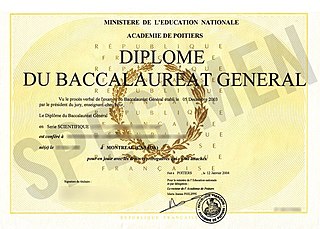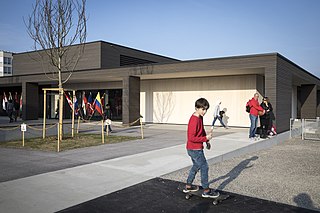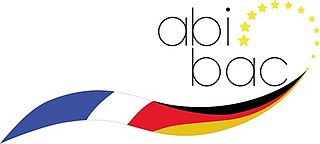Related Research Articles
The foreign relations of Switzerland are the primary responsibility of the Federal Department of Foreign Affairs (FDFA). Some international relations of Switzerland are handled by other departments of the federal administration of Switzerland.

The baccalauréat, often known in France colloquially as the bac, is a French national academic qualification that students can obtain at the completion of their secondary education by meeting certain requirements. Though it has only existed in its present form as a school-leaving examination since Emperor Napoleon Bonaparte's implementation on March 17, 1808, its origins date back to the first medieval French universities. According to French law, the baccalaureate is the first academic degree, though it grants the completion of secondary education. Historically, the baccalaureate is administratively supervised by full professors at universities.
The International Baccalaureate Organization (IBO), more commonly known as the International Baccalaureate (IB), is a nonprofit foundation headquartered in Geneva, Switzerland, and founded in 1968. It offers four educational programmes: the IB Diploma Programme and the IB Career-related Programme for students aged 15 to 19, the IB Middle Years Programme for students aged 11 to 16, and the IB Primary Years Programme for children aged three to 12. To teach these programmes, schools must be authorized by the International Baccalaureate.
A European School is a type of international school emphasising a multilingual and multicultural pedagogical approach to the teaching of nursery, primary and secondary students, leading to the European Baccalaureate as their secondary leaving qualification. Each European School is set up, financed, and operated by the international organisation, the "European Schools", controlled jointly by the member states of the European Union and the European Commission. The schools prioritise, for enrolment purposes, the children of EU staff.
The American Overseas School of Rome ('AOSR) is a private international school in Rome, Italy, accredited by the United States-based Middle States Association of Colleges and Schools. It has three divisions: Elementary School, Middle School and High School. It primarily caters to the international community in Rome, Italy. Students graduating receive the American high-school diploma or the International Baccalaureate. It has been an IB World School since April 1989. The Head of the School is Dr. Kristen DiMatteo along with Mr. Jerome Duggan as the secondary school principal and Ms. Joanne Mallary as the elementary school principal.

Institut d'études politiques de Bordeaux, also known as Sciences Po Bordeaux, is a French grande école located on the university campus of Pessac, Bordeaux. It is attached to the University of Bordeaux. Established in 1948, Sciences Po Bordeaux is one of the ten Institutes of Political Studies in France.

International High School of San Francisco, is a private co-educational high school in Hayes Valley, San Francisco, California, U.S.. Graduates earn either the International Baccalaureate ("IB") or the French Baccalaureate. The IB curriculum is primarily taught in English, while the French Bac is primarily taught in French.
The International Baccalaureate Diploma Programme (IBDP) is a two-year educational programme primarily aimed at 16-to-19-year-olds in 140 countries around the world. The programme provides an internationally accepted qualification for entry into higher education and is recognized by many universities worldwide. It was developed in the early-to-mid-1960s in Geneva, Switzerland, by a group of international educators. After a six-year pilot programme that ended in 1975, a bilingual diploma was established.
The Welsh Baccalaureate, or Welsh Bacc, is an educational qualification delivered in secondary schools and colleges across Wales. The Welsh Government says that it gives broader experiences than traditional learning programmes, developing transferable skills useful for education and employment. The Welsh Bacc is offered at Advanced, National Foundation and National/Foundation level, and is studied alongside a range of academic and vocational qualifications.
École Jeannine Manuel is a private and co-educational day school founded in 1954, with locations in Paris, Lille, and London.
The Lycee Français de Chicago is a private, French international school located in Lincoln Square, Chicago, Illinois. It offers a dual French and English curriculum. The Lycée is founded on the French National Curriculum as defined by the French Ministry of Education and complemented by an English language program in addition to foreign language courses.

The French American International School (FAIS) is a private co-educational school for PK–12 grade in San Francisco, California, U.S. The lower school (PK-8) is known as "French American" or simply "FAIS," FAIS is a bilingual French-English school from PK to 8th grade.

The Tunisian Baccalaureate, or Examen National du Baccalauréat, is a standardized test that was founded in 1891, a decade after the beginning of the French colonization of Tunisia (1881–1956). Students who successfully complete the baccalaureate are assured a place at a university, but not always to study their chosen subjects. The baccalaureate is both a school leaving and a university entrance examination, and the success rate is lower than for other tests of this type; on average, 60 percent of students who take it do not pass.

Lycée Français Marie Curie de Zurich (LFZ), German: französisches Gymnasium) is a French international school located in the municipality of Dübendorf, with more than 1,145 students from reception to year 13.

There are five French-German secondary schools known in German as Deutsch-Französisches Gymnasium (DFG) and in French as lycée franco-allemand (LFA). Mixing students, teachers and teaching methods of both countries, DFG/LFAs are highly selective schools of excellence. Their teachers are paid by the French and German states, and tuition is free of charge.

The Institute of Intercultural Management and Communication or ISIT, formerly Institut Supérieur d’Interprétation et de Traduction, is a French Grande École of Paris-Panthéon-Assas University.

International School of Berne (ISBerne) is an international school in Gümligen, Muri bei Bern, Switzerland. Founded in 1961, It serves primarily international students aged 3 to 18 and offers 2 diploma options. The curriculum is the International Baccalaureate and is taught in English. Two official Swiss languages, German and French, are taught as additional languages.
The Certificat d'aptitude au professorat de l'enseignement du second degré is a professional diploma from the French Ministry of National Education, Higher Education and Research. It is awarded to candidates who, after passing the tests of a recruitment competition, have been admitted to the professional qualification examination.
The BachiBac is a high school diploma offered at schools run by the French and Spanish states. It gives alums the same access to Spanish and French universities as the two countries' regular high school diplomas, Bachillerato and Baccalauréat. The first students started studying for the BachiBac in the 2010-11 school year.

The AbiBac is a French-German high school diploma offered in schools in France and Germany. It is the oldest of three bi-national high school programmes introduced by the French state, the others being EsaBac (French-Italian) and BachiBac (French-Spanish). The AbiBac was created by a French-German agreement on 31 May 1994.
References
- 1 2 "Ambassade de France à Rome". Ambassade de France à Rome. Archived from the original on April 2, 2015. Retrieved April 2, 2015.
- ↑ "Lycées italiens à section Esabac". Institut français Italia. Archived from the original on 13 August 2016. Retrieved 27 June 2016.